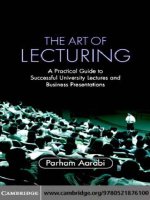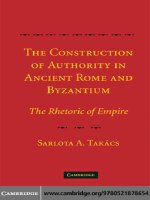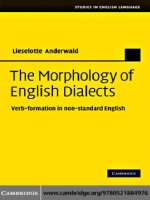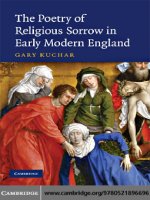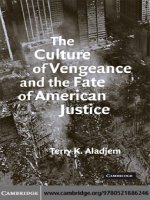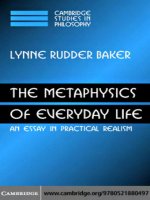052185959X cambridge university press the principle of sufficient reason a reassessment mar 2006
Bạn đang xem bản rút gọn của tài liệu. Xem và tải ngay bản đầy đủ của tài liệu tại đây (1.81 MB, 351 trang )
P1: JZZ
052185959Xpre
CUNY294/Pruss
0 521 85959 X
January 30, 2006
20:2
This page intentionally left blank
ii
P1: JZZ
052185959Xpre
CUNY294/Pruss
0 521 85959 X
January 30, 2006
20:2
The Principle of Sufficient Reason
The Principle of Sufficient Reason (PSR) says that all contingent facts
must have explanations. In this volume, the first on the topic in the English
language in nearly half a century, Alexander Pruss examines the substantive philosophical issues raised by the PSR, which currently is considered
primarily within the context of various cosmological arguments for the
existence of God. Discussing several forms of the PSR and selected historical episodes from Parmenides, Aquinas, Leibniz, Hume, and Kant,
Pruss defends the claim that every true contingent proposition must have
an explanation against major objections, including Hume’s imaginability
argument and Peter van Inwagen’s argument that the PSR entails modal
fatalism. Pruss also provides a number of positive arguments for the PSR,
based on considerations as different as the metaphysics of existence, counterfactuals and modality, negative explanations, and the everyday applicability of the PSR. Moreover, Pruss shows how the PSR would advance
the discussion in a number of disparate fields, such as metaethics and the
philosophy of mathematics.
Alexander R. Pruss is Assistant Professor of Philosophy at Georgetown
University. He has published many papers on metaphysics, philosophy of
religion, applied ethics, probability theory, and geometric symmetrization
theory. With Richard M. Gale he is coeditor of The Existence of God.
i
P1: JZZ
052185959Xpre
CUNY294/Pruss
0 521 85959 X
January 30, 2006
ii
20:2
P1: JZZ
052185959Xpre
CUNY294/Pruss
0 521 85959 X
January 30, 2006
20:2
cambridge studies in philosophy
General Editor walter sinott-armstrong (Dartmouth College)
Advisory Editors:
jonathan dancy (University of Reading)
john haldane (University of St. Andrews)
gilbert harman (Princeton University)
frank jackson (Australian National University)
william g. lycan (University of North Carolina at Chapel Hill)
sydney shoemaker (Cornell University)
judith j. thomson (Massachusetts Institute of Technology)
Recent Titles:
mark lance and john o’leary-hawthorne The Grammar of Meaning
d. m. armstrong A World of States of Affairs
pierre jacob What Minds Can Do
andre gallois The World Without, the Mind Within
fred feldman Utilitarianism, Hedonism, and Desert
laurence bonjour In Defense of Pure Reason
david lewis Papers in Philosophical Logic
wayne davis Implicature
david cockburn Other Times
david lewis Papers on Metaphysics and Epistemology
raymond martin Self-Concern
annette barnes Seeing Through Self-Deception
michael bratman Faces of Intention
amie thomasson Fiction and Metaphysics
david lewis Papers on Ethics and Social Philosophy
fred dretske Perception, Knowledge, and Belief
lynne rudder baker Persons and Bodies
john greco Putting Skeptics in Their Place
ruth garrett millikan On Clear and Confused Ideas
derk pereboom Living Without Free Will
brian ellis Scientific Essentialism
alan h. goldman Practical Rules: When We Need Them and When We Don’t
christopher hill Thought and World
andrew newman The Correspondence Theory of Truth
ishtiyaque haji Deontic Morality and Control
wayne a. davis Meaning, Expression and Thought
peter railton Facts, Values, and Norms
jane heal Mind, Reason and Imagination
jonathan kvanvig The Value of Knowledge and the Pursuit of Understanding
andrew melnyk A Physicalist Manifesto
iii
P1: JZZ
052185959Xpre
CUNY294/Pruss
0 521 85959 X
January 30, 2006
iv
20:2
P1: JZZ
052185959Xpre
CUNY294/Pruss
0 521 85959 X
January 30, 2006
20:2
The Principle of Sufficient Reason
A Reassessment
ALEXANDER R. PRUSS
Georgetown University
v
cambridge university press
Cambridge, New York, Melbourne, Madrid, Cape Town, Singapore, São Paulo
Cambridge University Press
The Edinburgh Building, Cambridge cb2 2ru, UK
Published in the United States of America by Cambridge University Press, New York
www.cambridge.org
Information on this title: www.cambridge.org/9780521859592
© Alexander R. Pruss 2006
This publication is in copyright. Subject to statutory exception and to the provision of
relevant collective licensing agreements, no reproduction of any part may take place
without the written permission of Cambridge University Press.
First published in print format 2006
isbn-13
isbn-10
978-0-511-22007-4 eBook (EBL)
0-511-22007-3 eBook (EBL)
isbn-13
isbn-10
978-0-521-85959-2 hardback
0-521-85959-x hardback
Cambridge University Press has no responsibility for the persistence or accuracy of urls
for external or third-party internet websites referred to in this publication, and does not
guarantee that any content on such websites is, or will remain, accurate or appropriate.
P1: JZZ
052185959Xpre
CUNY294/Pruss
0 521 85959 X
January 30, 2006
20:2
For my father and mother
vii
P1: JZZ
052185959Xpre
CUNY294/Pruss
0 521 85959 X
January 30, 2006
viii
20:2
P1: JZZ
052185959Xpre
CUNY294/Pruss
0 521 85959 X
January 30, 2006
20:2
Contents
Acknowledgments
page xiii
Part I The Principle of Sufficient Reason
and the Causal Principle
1 Introduction
1.1. The Significance of the PSR
1.2. A Restriction to Contingent Truths
1.3. Why Accept the PSR?
1.4. What Are We Talking About?
2 Reflections on Some Historical Episodes
2.1. Parmenides
2.2. Thomas Aquinas
2.3. Leibniz
2.4. Hume
2.5. Kant
3 The Causal Principle and the PSR
3.1. Chains of Causes
3.2. The ex Nihilo Nihil Principle, the PSR, and the CP
3.3. Resisting the Extension to Necessary Truths
3.4. Resisting the Restriction to Positive States of Affairs
3.5. A Survey of Some Principles
3
3
10
13
16
20
20
26
28
31
37
41
41
58
62
64
66
Part II Objections to the PSR
4 A Modern Version of the Hume Objection
4.1. Toy Models
4.2. A Possibility Principle
4.3. A Stronger Possibility Principle
4.4. The Empty World
4.5. Physicists Are Not Merely Logicians
75
75
76
77
78
79
ix
P1: JZZ
052185959Xpre
CUNY294/Pruss
0 521 85959 X
January 30, 2006
20:2
5 The Anti-theological Argument That There Are No
Necessary Beings
5.1. Cosmological Arguments
5.2. Necessary Beings and Absurdity
5.3. Rescher’s Alternatives to Invoking the Existence
of a Necessary Being
5.4. Is the Notion of a Necessary Being Absurd?
5.5. Philosophy of Mind Objections
5.6. Lawmakers and Laws
6 Modal Fatalism
6.1. Van Inwagen’s Argument
6.2. The Existence of the Big Conjunctive
Contingent Fact
6.3. The Nature of Explanation
7 Free Will
7.1. How to Explain Free Actions?
7.2. Reasoned Choices
7.3. Objections to Libertarianism
7.4. Sufficient Reasons
7.5. An Incredulous Stare
7.6. Contrastive Explanations?
7.7. The Modesty of This Account and Some Alternatives
7.8. Conclusions
8 Quantum Mechanics
8.1. The Problem of Indeterminism
8.2. Rejecting Indeterminism
8.3. Indeterminism and PSR
8.4. Particles Coming into Existence ex Nihilo
9 Turning Leibniz against the PSR
9.1. In Favor of (86)
9.2. A Defense of the TPII
9.3. Against (86)
9.4. Against (87)
10 What Survives the Criticisms of the PSR?
Part III Justifications of the PSR
11 Self-Evidence
11.1. A Definition of Self-Evidence
11.2. The Objection from Smart People
Who Disagree
11.3. But Isn’t the PSR Easy to Understand?
11.4. Two Ways Not to Understand
x
82
82
84
85
90
93
95
97
97
99
103
126
126
132
138
142
147
148
155
158
160
160
161
168
169
171
171
175
177
178
184
189
190
190
191
193
P1: JZZ
052185959Xpre
CUNY294/Pruss
0 521 85959 X
January 30, 2006
20:2
11.5. More Detail
11.6. Smart People Who Accept the PSR but Not
as Self-Evident
11.7. The Impasse
11.8. Mathematical Analogies
11.9. What Self-Evidence Could Be
11.10. Paradoxes
12 Three Thomistic Arguments
12.1. First Thomistic Argument: The Regress
of Existence
12.2. Second Thomistic Argument: The Interdependence
of Existence and Essence
12.3. Third Thomistic Argument: Substance-Accident
Ontology
13 Modal Arguments
13.1. The Strategy
13.2. Sullivan’s Argument for the CP
13.3. The Weak PSR
13.4. Causality and Counterfactuals
13.5. Conclusions
14 Is the Universe Reasonable?
15 Explanation of Negative States of Affairs
15.1. The Argument
15.2. The Defectiveness Objection
15.3. The Nomic Necessity Objection
16 The Puzzle of the Everyday Applicability
of the PSR
16.1. The Argument
16.2. An Abundance of Objections
16.3. Laws of Nature
16.4. Laws of Nature and the CP
17 Inference to the Best or Only Explanation
17.1. Can Inference to Best or Only Explanation
Be Rational without the PSR?
17.2. Preference for Explanatory Theories
17.3. The Sherlock Holmes Principle
17.4. Alternatives to the PSR That “Do the Job”
18 Inductive Skepticism
19 The Nature of Possibility
19.1. Alethic Modality
19.2. A Formalist Account
19.3. Lewis’s Theory
xi
196
198
199
200
205
207
209
209
217
229
231
231
232
234
239
248
249
252
252
252
253
254
254
255
262
267
280
280
281
283
285
295
299
299
301
302
P1: JZZ
052185959Xpre
CUNY294/Pruss
0 521 85959 X
January 30, 2006
20:2
19.4. Platonism: The Main Extant Realist Alternative
to Lewis
19.5. An Aristotelian Alternative
20 Conclusions
312
316
321
Bibliography
Index
323
331
xii
P1: JZZ
052185959Xpre
CUNY294/Pruss
0 521 85959 X
January 30, 2006
20:2
Acknowledgments
I am grateful for encouragement, discussions, comments, and/or suggestions to Denis Bradley, Robert Brandom, Robert Clifton, William
Lane Craig, Kevin Davey, Wayne Davis, William Dembski, James Dreier,
Thomas Flint, Peter Forrest, Richard Gale, Jerome Gellman, Alfonso
Gomez-Lobo, Michael Gorman, John Haldane, Jeremy Heis, Christian
Jenner, Chauncey Maher, David Manley, Mark Murphy, Thane Naberhaus, J. Brian Pitts, Alvin Plantinga, Nicholas Rescher, Lionel Shapiro,
Richard Sisca, Ernest Sosa, Thomas Sullivan, Joanna Tamburino, Peter
van Inwagen, Linda Wetzel, and anonymous readers who went beyond
the call of duty. I would also like to thank Mark Pitlyk for a thorough
proofreading of the manuscript, and the National Endowment for the
Humanities and Georgetown University for summer research support.
Portions of Chapter 13 are taken from my article “Ex Nihilo Nihil
Fit: Arguments New and Old for the Principle of Sufficient Reason,”
in: J. Campbell, M. O’Rourke, and H. Silverstein (eds.), Explanation and
Causation: Topics in Contemporary Philosophy, Cambridge, MA: MIT Press
(2006), copyright C 2006 MIT Press, with kind permission of the MIT
Press. Chapter 19 is largely taken verbatim from my article “The Actual
and the Possible,” in Richard M. Gale (ed.), Blackwell Guide to Metaphysics,
Oxford: Blackwell (2002), pp. 317–333, copyright C 2002 Blackwell
Publishing, with kind permission of Blackwell Publishing. The extended
footnote 6 of Chapter 16 is adapted from footnote 2 in my article “The
Cardinality Objection to David Lewis’s Modal Realism,” Philosophical
Studies 104 (2001), pp. 167–176, copyright C 2001 Kluwer Academic
Publishers, with kind permission of Springer Science and Business Media.
I would also like to thank Susan Thornton and Barry Koffler for
patiently correcting many infelicities and unclarities in my original
manuscript. Any remaining ones I take full responsibility for, of course.
xiii
P1: JZZ
052185959Xpre
CUNY294/Pruss
0 521 85959 X
January 30, 2006
xiv
20:2
P1: JYD
0521859592c01
CUNY294/Pruss
0 521 85959 X
January 30, 2006
16:1
Part One
The Principle of Sufficient Reason and
the Causal Principle
1
P1: JYD
0521859592c01
CUNY294/Pruss
0 521 85959 X
January 30, 2006
2
16:1
P1: JYD
0521859592c01
CUNY294/Pruss
0 521 85959 X
January 30, 2006
16:1
1
Introduction
Nothing happens in vain, but everything for a reason and under necessitation.
– Leucippus (Diels and Kranz, 1985, 67B2)
1.1. THE SIGNIFICANCE OF THE PSR
An airplane crash is investigated thoroughly. No cause for the malfunction
is found. The investigative team reports that the plane crashed for no cause.
We naturally object: “You mean, it crashed for no apparent cause.” But the
team insists that in fact there was no cause.1 Of course we might question
the epistemic bona fides of this finding. After all, there could always be
some cause beyond our ken. But can we do more? Can we insist that
there must have been a cause?
The Principle of Sufficient Reason (PSR) claims we can. Everything
that is the case must have a reason why it is the case. Necessarily, every
true or at least every contingent true proposition has an explanation.
Every event has a cause. The PSR in various guises is as old as philosophy. Parmenides used it to argue that there was no such thing as change.
St. Thomas proved the existence of God with a version of it apparently
based on his distinction between being and essence. Spinoza’s version
implied that there is no contingency. Leibniz attacked Newtonian absolute space for violating it and, together with Spinoza, used the PSR as
part of an argument against libertarian free will. Kant grounded a phenomenal version of it in the causal nature of time and, arguably, based his
transcendental idealism on a noumenal version (cf. Rescher, 2000b).
1 This example is taken from Rescher (1995, p. 2).
3
P1: JYD
0521859592c01
CUNY294/Pruss
0 521 85959 X
January 30, 2006
16:1
In late-twentieth-century Anglo-American philosophy the PSR was
primarily the preserve of the philosopher who, following St. Thomas,
came up with increasingly rigorous cosmological arguments for the existence of God. There must be an explanation of why there exist contingent
beings at all, and this explanation, at the pain of vicious circularity, cannot
itself essentially involve the existence of a contingent being, so there must
be a first cause whose existence is itself necessary. Indeed, despite some
notable dissent, it now appears generally established that once one grants
an appropriate version of the PSR, it follows that there is a necessary first
cause of the cosmos, that is, of the aggregate of all contingent beings.
This leaves two issues for the cosmological arguer to settle: whether this
first cause can be identified with the God of traditional theism and, more
basically, whether the PSR is true. And much of the twentieth-century
discussion of the formulation and truth of the PSR took place in this
context.
But it would be a philosophical mistake to leave the PSR to purely
theological uses. Philosophy starts in wonder, and wonder impels us to
find reasons for things. As the opening example shows, scientists and
ordinary people do presume events to have causes, though they do not
always reflect on whether the PSR is exceptionless and necessary. But
even a PSR contingently true and only true most of the time calls for
reflection. What kind of a reason do we have to believe in the PSR even
to this extent? And is it not then a puzzling fact about the universe that
the PSR is in fact true in as many cases as it is? Does this fact itself
have an explanation, or is this fact itself one of the exceptions to the
PSR?
On some accounts of scientific practice, the scientist makes an inference
to the best available potential explanation. Philosophy of science has not
given us a fully satisfactory account of how we are justified in assuming that
the best available potential explanation is in fact true. Does this problem
become any more pressing if one allows for the possibility that not only
the best available potential explanation is not true, but in fact there is no
true explanation?
Quantum mechanical indeterministic transitions are often taken to be
reasons to reject the PSR. But at the very same time, the indeterminism,
and hence the apparent violation of the PSR, motivates some, perhaps
even some as brilliant as Einstein, to prefer deterministic theories.
One of the most powerful arguments against traditional Humean
regularity theories of laws of nature is that mere regularities are not
4
P1: JYD
0521859592c01
CUNY294/Pruss
0 521 85959 X
January 30, 2006
16:1
explanatory: that As are always followed by Bs does not explain why
a given token of A is followed by a given token of B. If the PSR is
accepted, one then has reason to reject regularity theories, since then the
things that we normally think have causal explanations do not in fact have
causal explanations. But if the PSR is false, then the Humean can simply
accept the charge that mere regularity is not explanatory, but continue to
talk with the vulgar by using a stipulative notion, explains∗ , such that a
token of A being followed by a token of B is explained∗ by A’s always
being followed by B. A decision on the PSR is, thus, prima facie most
relevant to the debate on laws of nature.
In the philosophy of mind, the PSR would allow the objector to
property dualism to make the following opening gambit: The property
dualist needs to explain why it is that in fact the beings that have suchand-such physical states – for example, the physical states we have in virtue
of having human brains – also have such-and-such mental states. If the
PSR were not true, the property dualist could simply insist this is a brute
contingent fact about our universe, one not having any explanation.
But there are cases in which bringing in the PSR could conclusively
clinch an argument. There is a discussion since the time of Molina, motivated by concerns of providence, grace, and free will, about whether
there are any nontrivially true conditionals about what a person would
freely do in nonactual circumstances. The question is particularly vexed
in the case in which the person in question is herself nonactual. Are there
any contingently true conditionals of the form, “Were there to exist a
person x satisfying C, then x would freely do A,” where freely is understood in the libertarian sense and where no person identical with a person
satisfying C exists? Alvin Plantinga insists that there are. David Manley,
in conversation, offered basically the following refutation. By the PSR
(perhaps in some limited form), such a conditional would have to have
an explanation. But there is nothing in terms of which the conditional
could be explained in a world in which the agent does not exist. For
instance, there cannot be a nomological explanation, since that would
require a law of nature that persons satisfying C do A, which would vitiate the supposed libertarian freedom of the agent. Nor can there be an
explanation in terms of the action of any person, since the only possible candidate for such a person would be the nonexistent x, as it is
inconceivable how anybody else could bring it about that such a conditional would hold without thereby vitiating the hypothetical freedom
of x.
5
P1: JYD
0521859592c01
CUNY294/Pruss
0 521 85959 X
January 30, 2006
16:1
This is an instance of a general argument form:
(1) The proposition F is such that if it were contingent and true, then its
obtaining could not be explained.
(2) But all contingent true propositions have explanations.
(3) Therefore, F is necessary or false.
For another case, consider the following argument against Hartry Field’s
view that mathematical objects do not exist but could have existed. If
the PSR is true, then there must be an explanation of why mathematical
objects do not in fact exist, and if the PSR is necessarily true, then in
the possible world at which mathematical objects exist, there must be
an explanation of why they exist. On the plausible assumptions that the
explanations of the existence or nonexistence of contingent objects are
necessarily causal and that mathematical objects cannot stand in causal
relations,2 we see that Field’s philosophy of mathematics is incompatible
with the PSR. Similarly, we may argue on the basis of the necessity of
the PSR that mathematical truths, including unprovable ones such as the
ones G¨odel showed to exist, are all necessary. For what could explain,
were it a contingent truth, why a mathematical proposition, especially an
unprovable one, in fact holds? Descartes did think mathematical truths
could be given a causal explanation in terms of divine causality. But the
notion of causing a mathematical truth to be the case is most dubious.
Another example would be the following argument for the necessity
of moral truths. Specifically, the thesis to be argued for is that there is
no world just like ours in its non-moral features but in which there are
different deontic truths – say, torturing the innocent is a duty. Therefore,
if C is a complete description of the non-moral properties of our cosmos,
and p is any true deontic proposition, the proposition C ⊃ p is a necessary
truth. Moreover, this is true in every possible world. Thus, necessarily,
any deontic proposition p is a necessary truth when the circumstances
of application are sufficiently elaborated. Alternately, this can be put by
2 Field himself holds that mathematical objects cannot be causes and therefore would not
impinge on our consciousness if they existed. This is in fact a part of his reason for thinking
that they do not in fact exist. But it is hard to see what reason there is for thinking that
they could not be causes that is not based in general considerations according to which they
are the sort of being that simply cannot stand in causal relations at all. Moreover, if in fact
mathematical objects could be caused, then there would be a possibility that somehow our
minds might be capable of causing them to exist, and thus that we could know their existence
through our intentional knowledge – our knowledge of that which we intentionally bring
about. If this were so, then Field’s argument for the nonexistence of mathematical objects
would be weakened.
6
P1: JYD
0521859592c01
CUNY294/Pruss
0 521 85959 X
January 30, 2006
16:1
saying that the deontic features of our world supervene on the non-moral
ones.3
How to argue for a claim like this? The idea of a possible world just like
this one non-morally but where torturing the innocent is a duty seems
absurd. One might try to argue by simply saying: “Don’t you see the evil
of torture? Once you see it, you will see that torture couldn’t be right.” But
there is a more metaphysical argument. If the PSR is a necessary truth,
we can explain what is absurd about worlds differing in deontic features
but not in other features: We simply cannot see what could explain such a
difference. If contingent truths are ultimately to be explained causally, then
this is particularly clear. What could cause it to be the case that torturing
the innocent is a duty? The very idea of causing a deontic proposition
to be the case, other than by causing the non-moral circumstances of
its application, seems to be absurd. If we were utilitarians, we might say
that if evolution caused it to be the case that somehow torturing the
innocent were to cause them extremely intense pleasure ten years later,
then torturing the innocent might increase utility. But this difference
in deontic features would be achieved precisely through a difference in
non-moral features.
We might, of course, admit some cases of noncausal explanation of
contingent propositions. Thus, if p and q are contingent propositions
with p true and q false and with the disjunction p or q itself contingent, we
might want to say that the disjunction is explained by p’s being true. But
ultimately we still will want a causal explanation: for instance, we may want
to get to a causal explanation of p’s being true, unless p is itself disjunctive.
Likewise, if p is reductively explained by q, say the metal’s being hot by
its molecules moving rapidly, we will still want a causal explanation for q
or for something that q is in turn reductively explained by, and it appears
that an endless chain of reductive explanations, with nothing ultimate that
things are reduced to, is explanatorily unsatisfactory.
The idea of something’s directly causing a moral truth, without causing some set of non-moral circumstances to be actualized, seems absurd.
Moral truths, properly qualified in the form C ⊃ p where C is a sufficiently precise description of the non-moral circumstances, just do not
seem to be the sort of thing one can cause. The one example on the books
of such causal interaction is a divine voluntarism: God directly brings it
3 This claim is quite close to that which occurs at the locus classicus of the notion of supervenience, which is the claim that goodness supervenes on non-moral properties (Hare, 1964,
p. 80ff ).
7
P1: JYD
0521859592c01
CUNY294/Pruss
0 521 85959 X
January 30, 2006
16:1
about that some actions are duties, some are impermissible, and some are
neither, even though he could have brought it about differently. He does
not do this by engaging in some speech act such as engraving “Thou shalt
not murder” on a clay tablet, but by directly bringing about some moral
propositions. One is likely to be puzzled by this kind of a view precisely
because deontic properties just do not seem to be the sorts of properties
that can be caused except by causing the non-moral circumstances of
application of a moral truth. Once we admit that the deontic properties
of this world if not supervenient on the non-moral properties could not
be explained, then, given the PSR, we have good reason to hold to the
thesis that deontic truths, when properly qualified in terms of non-moral
circumstances, are necessary truths. This is not a knock-down argument.
But it shows where the discussion should be focused: What would deontic
facts have to be like if they were contingent and capable of being brought
about not through bringing about non-moral facts? It at least seems likely
that something like divine voluntarism would have to be true were moral
facts to be contingent.4
Neither does it really help here to note that causal explanations need
not have the state of affairs reported in the explanans causing the state
of affairs in the explanandum: the relationship can be more complicated.
For instance, that E caused F is a paradigmatic explanation of why F
occurred. But E’s causing F does not cause F. This is a case of a causal
explanation, but for categorial reasons we do not want to say that the state
of affairs reported by the explanans causes that reported by the explanandum. Similarly, an agent- or substance-causation account can provide
an explanation, but there is no state of affairs causing anything at all
there. When we say that some event happened because Fred, a substance,
caused it, there is no causal relation, except perhaps as a fac¸on de parler,
between any state of affairs or event and an event: the whole point of
the theory is that the relation is between a substance and an event. There
may be more complicated relations. For instance, I will argue in Chapter 7 for the prima facie strange claim that it makes sense to say that in
4 Observe that social constructivism would not be a counterexample here. Either social constructivism is an error theory about morality that says that there are no moral truths but
only moral “truths,” or else social constructivism thinks that there are moral facts but they
are produced by society. The first view does not provide a counterexample. But on the
second view, the social constructivist does not hold that society directly brings about certain
moral truths. Rather, society brings about moral truths, given social constructivism, through
engaging in certain speech acts. The occurrence or nonoccurrence of such speech acts can
be thought of as part of the circumstances.
8
P1: JYD
0521859592c01
CUNY294/Pruss
0 521 85959 X
January 30, 2006
16:1
some cases it could be self-explanatory that an agent freely chose something. This is a causal explanation in the sense that causation is invoked
– the agent freely chose something. But since nothing can be causa sui,
this is another case in which what is reported in the explanans does not
cause what is reported in the explanandum. Nonetheless, none of these
other kinds of causal explanations seems to help us explain an allegedly
contingent moral claim.
Similar things could be said in favor of other supervenience claims,
such as that of the aesthetic on the nonaesthetic or of epistemic statuses
on things other than epistemic statuses. Consider the latter case. If the PSR
were false, we could give a very simple epistemology, which the attentive reader will notice is a straw-man version of Plantinga’s Reformed
epistemology. Some belief-forming processes just happen to be “properly functioning” and “truth directed.” There is no explanation as to
which processes have one or both of these properties – this is just a brute,
unexplained contingent fact. Any true proposition delivered by properly functioning truth-directed belief-forming processes is knowledge.
No counterexample can be given to this theory. Suppose you give me
some case where it seems that knowledge arose not from a truth-directed
belief-forming properly functioning process. Then I can just say that the
process in these particular circumstances happens to be truth directed and
properly functioning. Or if you give me a Gettier-type case where a truthdirected properly functioning process delivers a true belief that is not a
case of knowledge, I can say that appearances notwithstanding, in these
circumstances the process happened not to be truth directed and properly
functioning.
You might criticize my naive epistemology on the grounds that the
contingency involved is contrary to our modal intuitions. We have the
modal intuition that there is no world like ours in terms of features other
than epistemic statuses but in which peering into a crystal ball on some
particular occasion, and only on that occasion, delivers knowledge of
the distant future. But I can explain your intuition as simply based on
our firm knowledge – that is, the deliverance of a truth-directed properly
functioning process – that in our world crystal-ball peering is not a properly
functioning truth-directed process. And if you do not accept this, then I
can just make a modal move. Yes, indeed, crystal ball peering is necessarily
not a properly functioning truth-directed process in a world with laws
of nature like those of our world. But I refuse to give you a criterion
for which processes are necessarily like this – there just is no explanation
for the fact that some processes are necessarily properly functioning and
9
